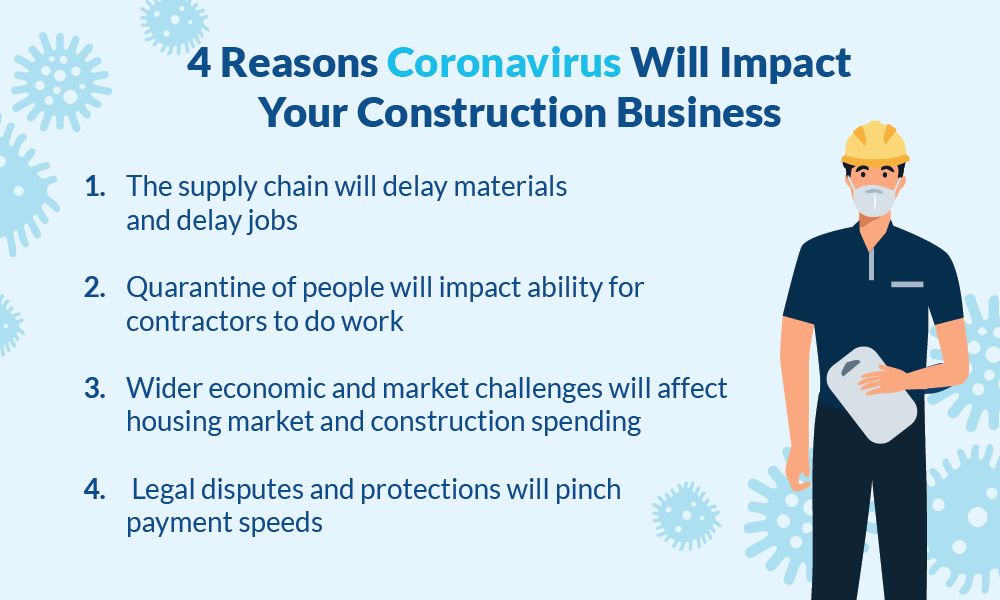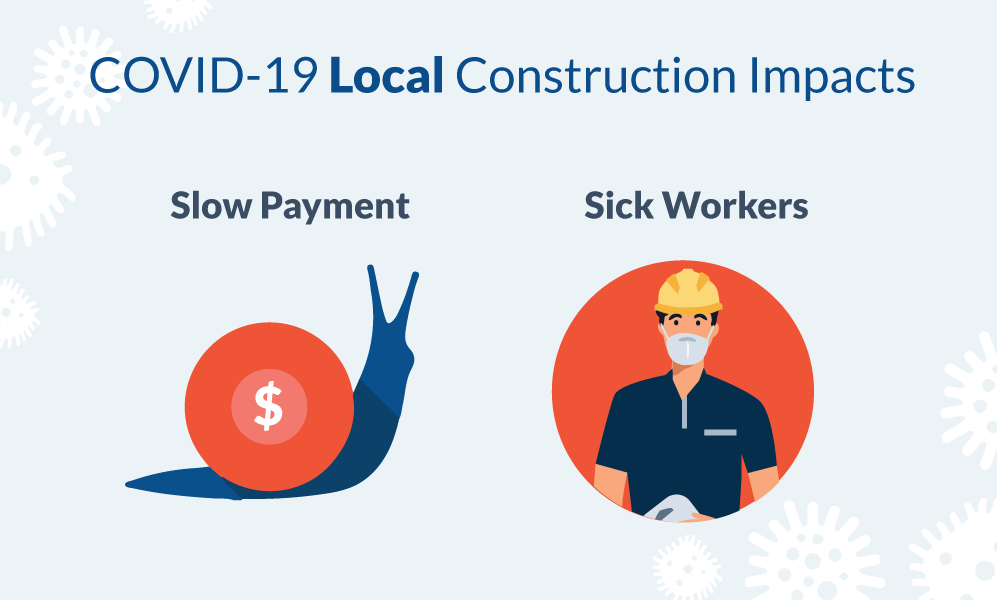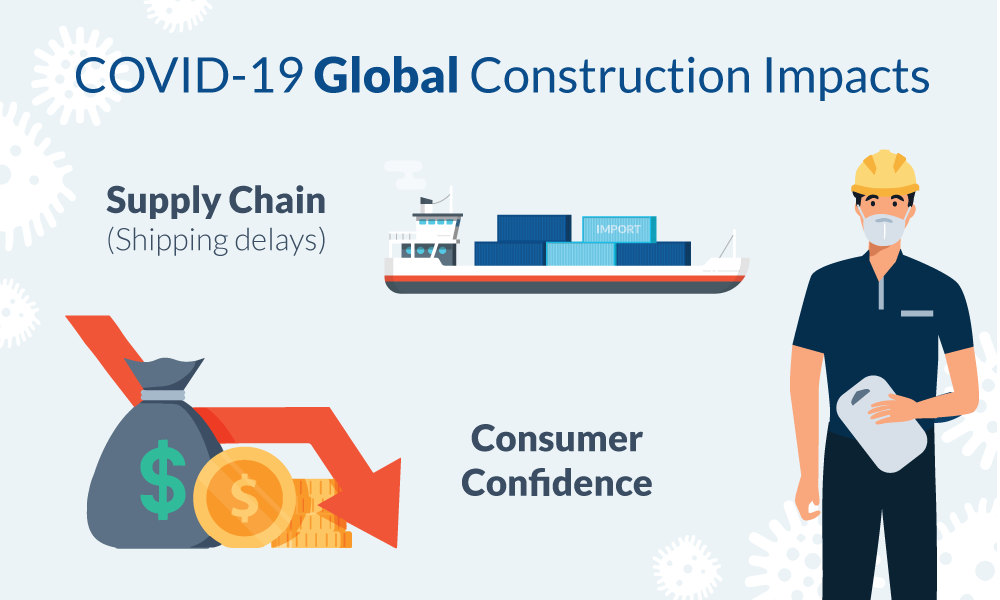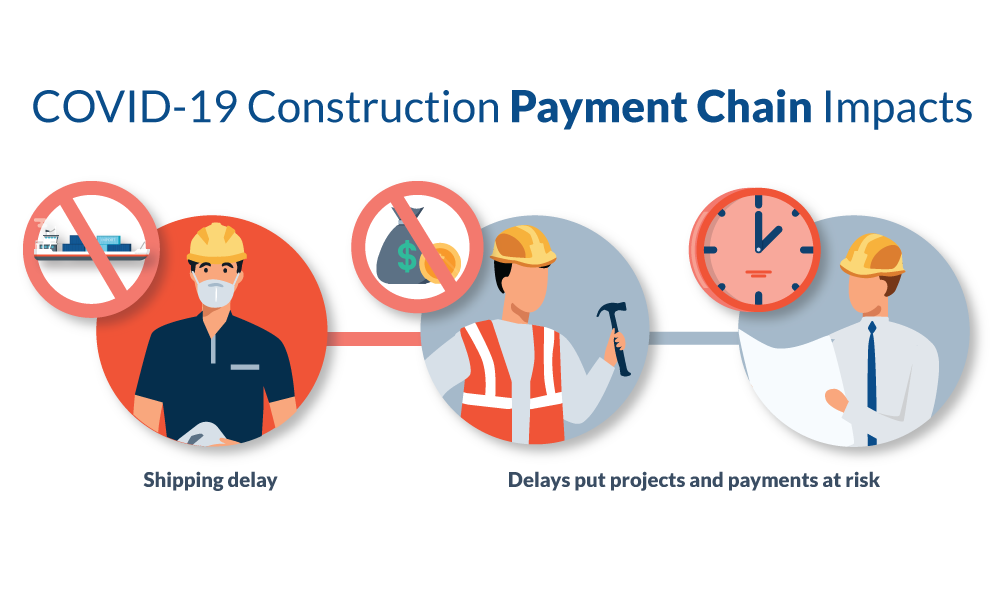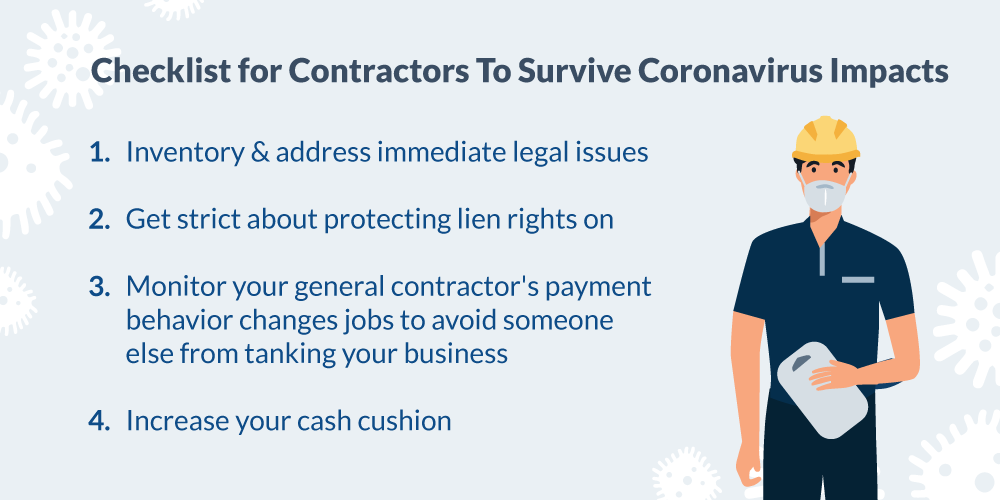
Getting paid as a construction contractor is already hard without the coronavirus. Contractors face a major cash threat with the coronavirus outbreak and threatening recession. This article examines how current affairs around the coronavirus outbreak will impact your construction business, and what you’ll need to do to survive.
4 Reasons Why Coronavirus Will Impact Your Construction Business
Contractors already have some of the highest failure rates and the longest waits for payment of businesses in any industry. Getting paid is hard, and cash is a constant challenge. This is a deadly challenge in turbulent economic environments.
The coronavirus (COVID-19) is having an enormous impact on people and families individually. It’s also having a growing impact on the overall economy. Current effects include a halt in stock market trades due to a triggering of a “circuit breaker,” business and school closings, and a halt of travel between the United States and Europe.
It’s clear that the coronavirus will impact the construction industry and your business. Here are 4 reasons why.
1. The supply chain will delay materials and delay jobs
Problems and material delays will impact jobs. The industry is already seeing the effects of this.
Early coronavirus disruptions occurred in China. Since China represents about a third of global manufacturing, its production delays are already manifesting across the world…and on construction jobs.
Construction economists are weighing in and they are in remarkable agreement.
Richard Branch, who is Dodge Data & Analytics’ chief economist, is on record that contractors can expect material costs to go up and jobs to see slower completion times.
Contractors are already feeling and talking about the pinch.
Dan Kaufman, a regional president with JE Dunn Construction, is quoted in a recent ENR article about job delays they are suffering because of problems with material delays. Speaking about one example project, he says, “it’s an immediate critical path impact of up to eight weeks on a job, which is obviously paralyzing, and we’ve got to figure a way around that.”
2. Quarantine of people will impact the ability for contractors to do work
Massive quarantines are happening across the world. Regardless of whether they get more or less severe, quarantines will impact construction jobs.
Leo Quinn, the CEO of Balfour Beatty, says executives meet twice-weekly about the virus. Specifically about quarantines, the CEO said they may close down job sites. “If we feel we have to close a site, we will,” Quinn said.
Here are different ways that quarantines and personnel availability will impact construction jobs:
- Workers who are ill are unable to come to work
- Workers may fear work even if healthy, due to concerns over large groups of people
- Quarantines will make job workers unable to come to work
- Quarantines will affect lenders, sureties, governments, and developers, all of which will pinch jobs
Illnesses, quarantines, and local regulations will slow down jobs and potentially shut them down. Contractors will find themselves on construction projects where people don’t come to the job site whether these no-shows are due to actual sickness or fear of the spreading virus. This will slow down jobs, lead to confusion over how to complete work to get paid, and open up another rabbit hole of potential problems.
Related to payment, this all impacts the intricate exchange of documents required for payment. People will be left dangling on the payment hook if the person in charge of collecting lien waivers or pay application is not in the office.
3. Wider economic and market challenges will affect the industry
“The risk of recession over the next three to six months is arguably more elevated than at any period since 2007,” said economist Anirban Basu of Sage Policy Group.
The possibility of global economic slowdown or recession is a real threat, and obvious. And this will impact your construction business and your livelihood.
While the specific scenario regarding both the ultimate reach of coronavirus and its impact on the global economy is unknown, the best-case scenario results in slowed economic growth globally in 2020, while more pessimistic scenarios show a global recession and reduction in GDP of more than 1%.
Specifically residential or light commercial projects could see serious downturns if individual discretionary spending is limited.
4. Legal disputes and protections will pinch payment speeds
Construction payment is a mess in the best of times. Adding economic uncertainty and additional logistical problems to the mix is a recipe for payment disasters.
When external circumstances create pressures on one participant, those pressures are felt by everyone – and the companies at the bottom of the payment chain are squeezed the hardest.
In this global pandemic, we are seeing supply chain disruptions, recession signals, workers and job participants getting quarantined at massive scales, and more. This will create legal disputes, job delays, payment delays, and expensive disruptions to contractors.
With razor-thin margins, any kind of payment hiccup can mean the difference between staying in business and closing up shop.
Video: 4 Steps Every Construction Business Needs to Take During COVID-19
Checklist for Contractors To Survive Coronavirus Impacts
You can survive and thrive in the face of all the economic and performance challenges. It’s important that you don’t make deadly mistakes. Here is a checklist that you should consult with your team to survive in the difficult year ahead.
1. Inventory & address immediate legal issues
Your business has immediate legal issues and challenges to address – and you want to get on top of these right away.
Right now.
You have live jobs and live construction contract obligations. It’s important to do an inventory of these to make sure you’re protected against negative impacts encountered in the next few weeks. Or ones already at your doorstep.
Here are some examples:
- Notice provisions: Many contracts require you to give notice within a very short time period in the event of any delays, change orders, etc. And courts are known to strictly enforce these! Get your notices prepared for any jobs that are delayed, any materials that are impacted, etc. Learn more in our Complete Guide to Construction Notices.
- Are your contracts voided? Can you void them? Many contracts have provisions in them that contemplate “acts of God.” These are called force majeure provisions. Read them. Understand how delay provisions may affect your rights and obligations during an epidemic.
- Create new agreements: It’s in everyone’s best interest to get ahead of potential disagreements. In this helpful Building.Uk article, it’s suggested to “write [and agree on] appropriate provisions…so reasonable precautions are taken to prevent the spread of diseases,” among other things.
It’s a good idea to consult with a construction attorney on this stuff. We’re offering Levelset users a free consultation with a construction attorney to prepare for surviving and thriving despite the coronavirus.
You can get free legal advice on other topics, too, from Levelset’s network of construction attorneys.
2. Get strict about protecting lien rights
It’s time to get strict about protecting your lien rights.
Whether you get paid, and when you get paid, is now dependent on tons of things out of your control. Don’t get caught by a stray bullet here. You want to pay attention to 2 simple things.
On All Jobs: Send a Preliminary Notice
Preliminary notices are crucially important to protect you against payment problems on a job….especially problems that are not your fault.
In 2020, it’s highly likely that you’ll encounter jobs and payments that are delayed. It’s highly likely that you’ll encounter other contractors who have significant cash stress and/or file bankruptcy.
When you encounter this stuff, you will be left holding the bag if you didn’t send a preliminary notice. You will have a payment problem in 2020. If you don’t send preliminary notice…you’ll get stiffed. If you do send your notices, you’ll likely be fine.
You will have a payment problem in 2020. If you don’t send preliminary notice…you’ll get stiffed. If you do send your notices, you’ll likely be fine.

On Jobs When Payment Is Pinched: Pull The Trigger!
If payment begins to drag on any of your jobs you want to have an itchy finger. Pull the trigger and escalate the matter to protect your rights. This means sending a notice of intent to lien, and/or filing a mechanics lien.
In normal circumstances, many are willing to give your customers and other participants more time.
Construction contractors need more caution in the current environment with coronavirus.
You don’t want your own cash circumstances to put you out of business. Pulling the trigger early is the fastest and most certain way to keep your cash coffers full.
Also, you don’t want to lose your payment rights. It’s important to pay close attention to your lien deadlines and to take action with enough time.
In today’s environment, county recorder offices are closing and limiting their availability. Mailing systems are stressed. And more. Don’t wait to protect your important cash and payment rights. Find out how to file documents remotely when your county offices are closed.
3. Monitor your general contractor’s payment behavior changes
The general contractor on your job is going through a major disruptive event with coronavirus. They will struggle with the project schedule, with legal disputes, with worker shortages, and with cash.
It’s important to keep close watch of the general contractors on your job.
- Have you seen an increase in payment problems?
- Are they starting to pay contractors more slowly?
- Did you notice retainage practices changing?
This is a great time for the best general contractors to shine. But, it’s a very trying time. It’s important that you monitor your GCs because their behaviors will directly impact your business and whether it survives.
Monitor your GCs with Levelset for free.
4. Increase your cash cushion
Economist Anirban Basu, from Sage Policy Group, has great advice for contractors: “raise cash, determine if lines of credit are large enough, consider staffing models, and ensure the good graces of bankers and insurers.”
Cash is king. Getting access to cash and managing cash is extremely important.
Here are a few things that can help.
- Working capital loans: Take quick action to apply for working capital loans…even if you don’t need it right now.
- Buy materials with longer terms: You should take advantage of programs, like this one with Levelset, that lets you buy materials with longer payment terms and work any any supplier. This will help streamline your cashflow and allow you to take on more jobs in 2020.
- Keep an eye out for SBA Loans: The SBA is preparing loan offerings for contractors impacted by the coronavirus. Jump on this and get cash for your business.
Conclusion: Don’t Get Burned. Get Paid & Protect Your Business.
While the ultimate impact of coronavirus / COVID-19 on construction is unknown and speculative, a few things are certain:
- The virus is having and will continue to have at least some negative effect on the global economy
- Construction companies will experience extreme cash stresses
- There are ways to protect your business and come out alive
